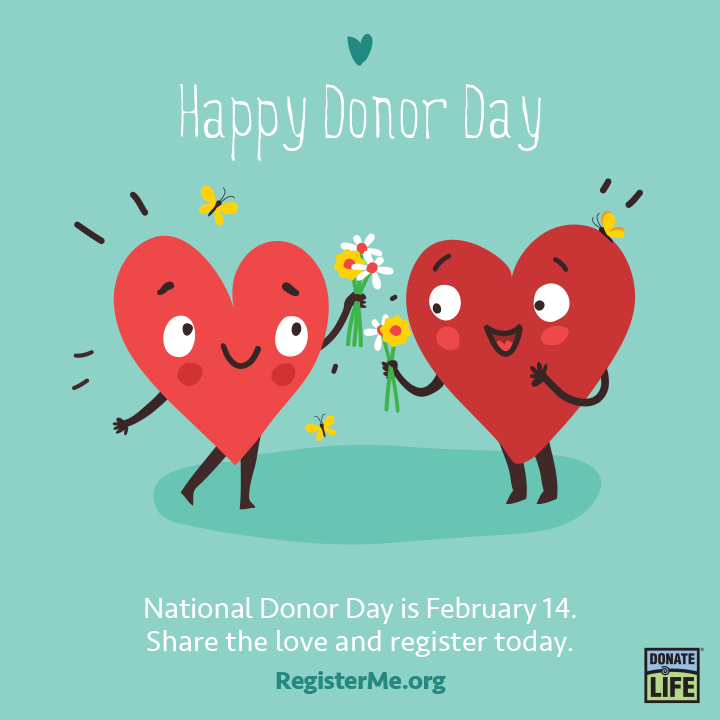Published February 11, 2020
 Observed every year on February 14th, National Donor Day is dedicated to spreading awareness and education about organ donation. It is also a day to recognize our loved ones who have given the gift of donation, have received a donation, are currently waiting, or did not receive an organ in time.
Observed every year on February 14th, National Donor Day is dedicated to spreading awareness and education about organ donation. It is also a day to recognize our loved ones who have given the gift of donation, have received a donation, are currently waiting, or did not receive an organ in time.
Dwight Odland, Los Angeles Chapter Coordinator and former Board member, helped Kari Carson find a kidney donor last year. He shared with us his part in her story and how one person can make a difference in many lives.
PKDF: What is your PKD story and how did you become involved with the PKD Foundation?
Dwight: I was diagnosed with PKD as a de novo mutation when I was 20 years old and I attended my first PKD Foundation conference in 2000. However, it wasn’t until I attended a Los Angeles Chapter meeting in 2005 that I become more involved with the Foundation. The current Chapter Coordinator was getting ready to have a transplant, so the local PKD Foundation representative, Laura Hessenflow, asked if I would consider taking over as Chapter Coordinator. I agreed and have been the Chapter Coordinator ever since.
I was later recruited to the PKD Foundation Board of Directors by the Foundation CEO at the time, Gary Godsey, who saw my passion and felt my business experience, combined with being a PKD patient and volunteer, would offer an important perspective. It was a great experience and I recently completed six years on the Board.
PKDF: You recently helped a local PKD patient, Kari Carson, get a living donor for her transplant. How did you become involved?
Dwight: Kari Carson reached out to me via Facebook because her GFR was dropping and she thought it was time to consult a PKD specialist. Kari wanted to avoid dialysis. I suggested she contact the transplant center at UCLA. Then I suggested she contact Harvey Mysel at the Living Kidney Donors Network to discuss finding a living kidney donor, her best option to avoid dialysis and the kidney donor waitlist. Harvey was actually going to be in Orange County speaking, so I invited her to come.
She found UCLA to be very helpful and liked the doctors there who would help her with a transplant. With Harvey’s guidance, she launched a very successful living kidney campaign, finding a donor in less than a year.
She reached out to me again because she found a kidney donor, but the UCLA transplant team wanted to postpone her transplant until her GFR was below 18%. She didn’t want to ask her donor to wait and risk something happening that could put her at risk of going on dialysis. I contacted my doctor, Dr. Rastogi, who is part of the PKD clinic at UCLA, and we advocated on her behalf. They finally agreed she could go ahead.
PKDF: Have you helped others like Kari before?
Dwight: One of the parts I enjoy the most about being Chapter Coordinator is the chance to help people who are newly diagnosed or facing challenges because of their PKD. I am contacted several times a month through our web page and Facebook page. I usually help by phone and email, but at least a couple of times a year people want to meet in person, which I really enjoy.
So many people feel guilty about asking for a kidney donor, but when you point out they are asking because of a concern about their family’s well-being, it changes the message. PKD is a family disease, and so is getting a transplant.
PKDF: What keeps you motivated as a PKDF volunteer?
Dwight: If not me, then who?
Growing up, I learned from my mother about the value of a support network. My father was diagnosed with Alzheimer’s in the 1970s. Back then, there was no internet and there wasn’t a great deal of information or support for Alzheimer’s to be found. My mom felt isolated and needed someone to talk to and ask questions. She looked around and there didn’t seem to be anyone, so she decided to start a small caregiver group, where they could support each other and share information. I watched as she stuck with it, evolving the group into one of the largest and long-lasting Alzheimer’s support groups in the country.
Helping people and showing them the hope, that is what I like to do. I want to take away their despair. I have spent a lot of time speaking to researchers and doctors. I became very involved with the Foundation, including serving on the Board and various committees, so I know how committed the staff and leadership are. I know how the money raised is being spent, giving me complete confidence in the Foundation. This all gives me a chance to connect with others, make a difference in someone’s life, and make new friends.
PKDF: How can volunteers help with fundraising?
Dwight: Get more involved with the Foundation. Learn whatever you can about PKD and the PKD Foundation, because the more you know, the more confidence you have. It is easier when you know what is needed and know the Foundation is a good steward of people’s donations.
PKDF: Is there anything else you would like to share?
Dwight: I am very happy to say that the arguments Dr. Rastogi and I made for moving up Kari’s transplant helped change the policy at UCLA regarding PKD transplant patients. They now understand the reason PKD patients need the option to have a transplant sooner, before there is a marked decrease of GFR below 20%. They now consider both the transplant patient and the kidney donor in proceeding with a transplant.
Keep an eye out for Part Two — we will be sharing Kari’s story later this week. In the meantime, share your story, find out more about kidney transplantation, and support National Donor Day.









Dwight, I have so much respect for you after reading this. What really spoke to me was “if not me, than who?” Living with PKD and witnessing the toll it’s taken on my mother’s health, I’ve felt helpless at times. You sir, have inspired me to sign up as a volunteer! I may have a busy schedule between work and being a mother, but I WILL make time to volunteer for this.